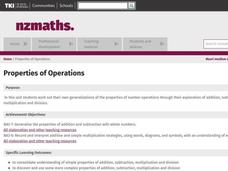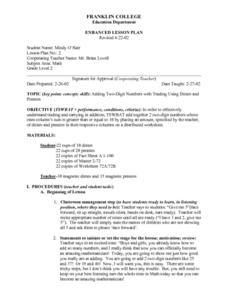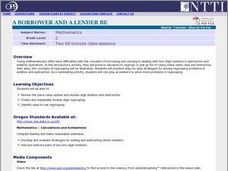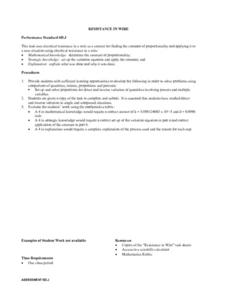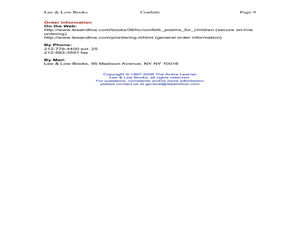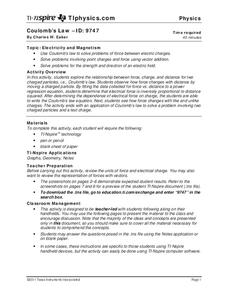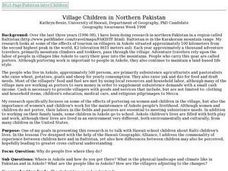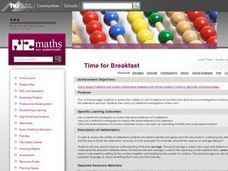New Zealand Ministry of Education
Properties of Operations
Learners consolidate and extend understanding of simple properties of the four arithmetic operations. They use these properties as an aid to easy calculation. They discover and use some more complex properties of addition, subtraction,...
Curated OER
Interview With A Legend
Eighth graders investigate how Language Arts and Social Studies can be integrated in the curriculum. They conduct research about a famous person in history. Then students use the information to write a report for the class. Then students...
Curated OER
Adding Two Digit Numbers with Using Dimes and Pennies
Second graders participate in a math game using dimes and pennies. They practice combining coins to make a given amount of money, and they use the combinations to practice adding two digit numbers. Teacher assessment strategies and...
Curated OER
A Borrower And A Lender Be
Second graders practice addition and subtraction in this fun, technology-based Mathematics instructional activity for the second grade classroom. The instructional activity includes resource links, video clips, interactive websites, and...
Curated OER
Four + One = Five
For this algebra worksheet, learners decipher a cryptarithm to make an addition problem. They have to figure out what digit each letter represent to be able to solve this problem. There is an answer key with this problem.
Benjamin Franklin Tercentenary
Benjamin Franklin, Working for the Common Good
Young scholars examine Benjamin Franklin's community service in Philadelphia. In this American history famous heroes instructional activity, students make text-to-self-and-world connections between the Philadelphia community service...
Curated OER
Resistance in a Wire
Students find the constant of proportionality and apply it to a situation. They use the electrical resistance in a wire as a context for finding the constant of proportionality. In addition, they write an explanation and justification of...
Curated OER
Celebrate Sunflowers
Students skip count with sunflower seeds. For this interdisciplinary lesson, students discuss the history of sunflowers. Students count by 1's, 2's, and 10's with bags full of sunflower seeds.
Curated OER
Can You Hear Me Now? A Study Unit on Cell Phones
In this comprehensive reading comprehension lesson, young scholars complete an indepth look at the introductions and history of cell phones. Students research, analyze and determine the answers to twenty two questions regarding what a...
Curated OER
Confetti
Third graders complete pre reading, writing, during reading, and interdisciplinary activities for the book Confetti. In this reading lesson plan, 3rd graders complete journal entries, go over vocabulary, answer short answer questions,...
Curated OER
Coal Flowers
Let's make coal flowers! With this fun activity, young learners watch and learn as they grow crystals! With simple household materials and the instructions included in this lesson plan, your class can grow their own crystals. Learners...
K5 Learning
The Swift Runner
How did the deer get its antlers? Learners read through a short story about an animal race and the winner's prize before answering comprehension questions.
Curated OER
Sock Walk
First graders, after brainstorming all the ways seeds are scattered and viewing a multitude of examples of seeds, explore how seeds travel by taking a walk outdoors wearing socks over their shoes. In addition, they assess how seeds...
Curated OER
Utah History & Geography
Fourth graders calculate and determine the distances between counties in Utah. Using a map of Utah, they determine the distance between three county seats, the total distance round trip, and label a map with the distances.
Curated OER
Jack and the Beanstalk Estimation
Students use estimation and pencil-paper calculations to help Jack and his mother solve a variety of life problems. They solve problems using various math operations, i.e., addition, subtraction, and measurement.
Curated OER
Coulomb's Law
Students solve problems involving electric charges and force. In this physics lesson, student solve word problems using addition and subtraction of vectors. They identify the direction represented by a vector as it relates to an electric...
Curated OER
Ethanol
Students explore how to fuel cars with corn and then test different items to explore the process of fermentation.
Curated OER
Village Children in Northern Pakistan
Student use maps to answer geographic questions. They analyze Earth's surface by using a map to identify physical features that lead to different transportation routes. Student create a collage to show geographic insight into the topic...
Curated OER
Managing Nutrients in Livestock Manure
Livestock managers reinforce math and science skills while learning about the nutrients found in manure. They predict which animal produces the largest amount and which animal's manure contains the most nitrogen. Finally, they compare...
Curated OER
Chromosomes
In this chromosomes worksheet, students complete a crossword puzzle with 33 questions about genetic mutation in chromosomes. They identify traits associated with certain genes.
Curated OER
Adding More
In this addition worksheet, students solve six problems in which objects in a set are counted and additional objects are added to these, according to directions. Students write how many in all.
Curated OER
The Constitution Lives! How it Protects Your Rights Today
Learners brainstorm their rights as Americans. In this The Constitution Lives! lesson, students discern the difference between rights and rules by completing a worksheet. Learners consider the differences between types of constitutional...
Curated OER
Get Ready, Get Set, Squeeze!
Students explore coin value and count coin combinations. In this money counting and social studies lesson, students read The Coin Counting Book by Rozanne Lanczak Williams and practice counting money and making change for a lemonade...
Curated OER
Time For Breakfast
This unit encourages students to assess the validity of a set of statements and then plan and carry out investigations to find out whether the statements are true. Students then carry out statistical investigations of their own.
